Serving 309 students in grades Kindergarten-12, Rising Leaders Academy ranks in the top 20% of all schools in Florida for overall test scores (math proficiency is top 30%, and reading proficiency is top 30%).
The percentage of students achieving proficiency in math is 65-69% (which is higher than the Florida state average of 52%). The percentage of students achieving proficiency in reading/language arts is 65-69% (which is higher than the Florida state average of 52%).
The student:teacher ratio of 22:1 is higher than the Florida state level of 17:1.
Minority enrollment is 47% of the student body (majority Black), which is lower than the Florida state average of 65% (majority Hispanic).
Quick Stats (2025)
- School Type: Charter School
- Grades: Kindergarten-12
- Enrollment: 309 students
- Student:Teacher Ratio: 22:1
- Minority Enrollment: 47%
- Overall Testing Rank: Top 20% in FL
- Math Proficiency: 65-69% (Top 30%)
- Reading Proficiency: 65-69% (Top 20%)
- Science Proficiency: 50-59% (Top 50%)
- Source: National Center for Education Statistics (NCES), FL Dept. of Education
Top Rankings
Rising Leaders Academy ranks among the top 20% of public schools in Florida for:
Category
Attribute
Overall Rank
Reading/Language Arts Proficiency
School Overview
Rising Leaders Academy's student population of 309 students has grown by 49% over five school years.
The teacher population of 14 teachers has grown by 7% over five school years.
School Type
Grades Offered
Grades Kindergarten-12
Total Students
309 students
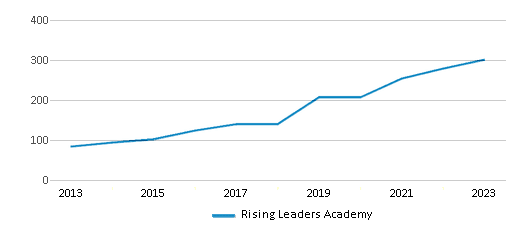
Gender %
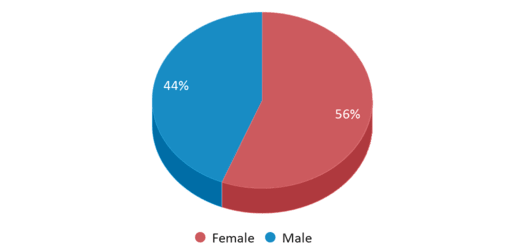
Total Classroom Teachers
14 teachers
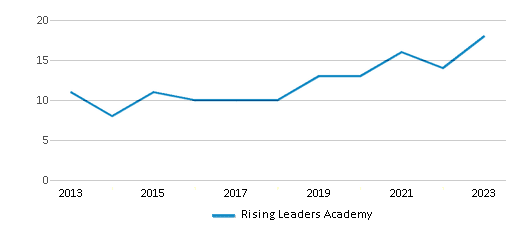
Students by Grade
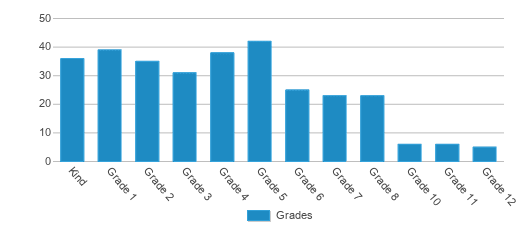
School Calendar
School Rankings
Rising Leaders Academy ranks within the top 20% of all 3,704 schools in Florida (based off of combined math and reading proficiency testing data).
The diversity score of Rising Leaders Academy is 0.66, which is less than the diversity score at state average of 0.70. The school's diversity has stayed relatively flat over five school years.
Overall Testing Rank
#737 out of 3704 schools
(Top 20%)
(Top 20%)
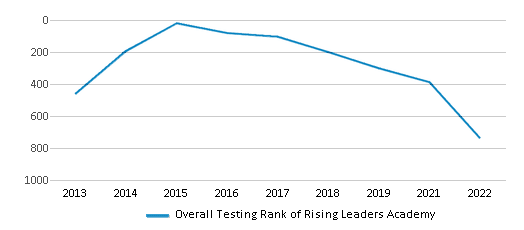
Math Test Scores (% Proficient)
65-69%
52%
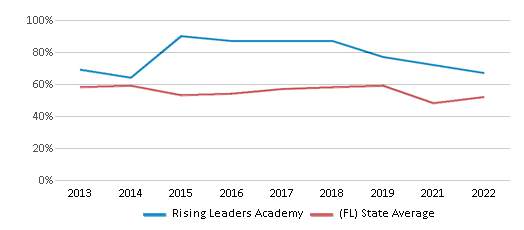
Reading/Language Arts Test Scores (% Proficient)
65-69%
52%
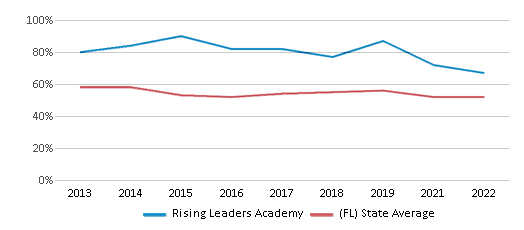
Science Test Scores (% Proficient)
50-59%
52%
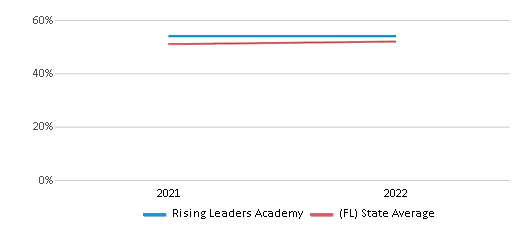
Student : Teacher Ratio
22:1
17:1
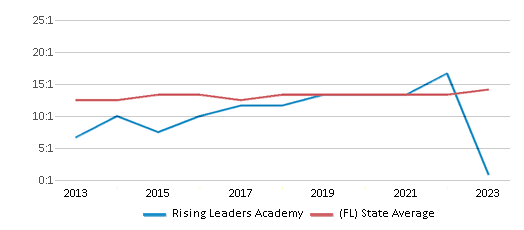
American Indian
1%
n/a
Asian
5%
3%
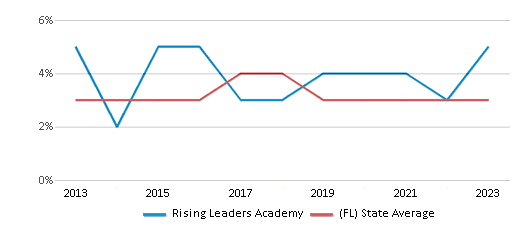
Hispanic
13%
37%
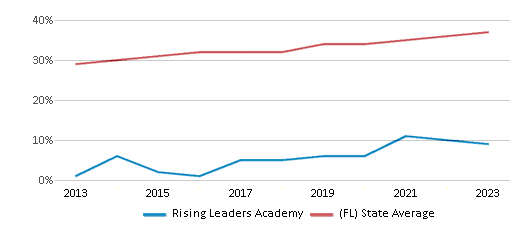
Black
20%
21%
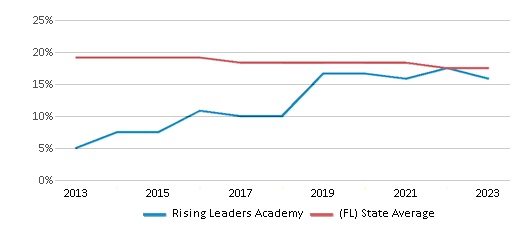
White
53%
35%
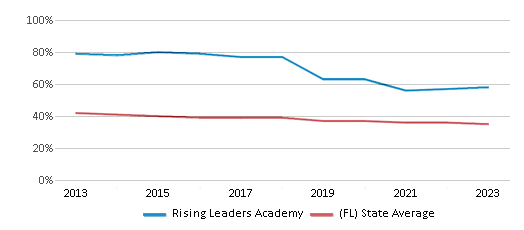
Hawaiian
n/a
n/a
Two or more races
8%
4%
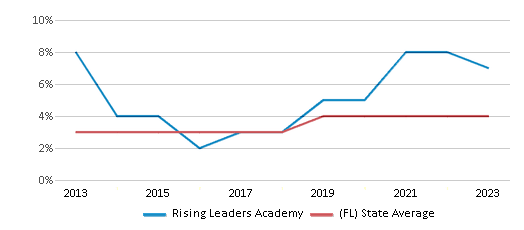
All Ethnic Groups
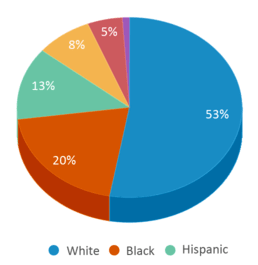
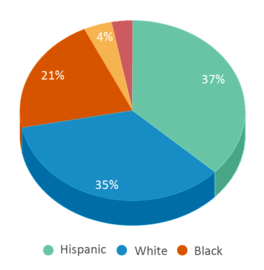
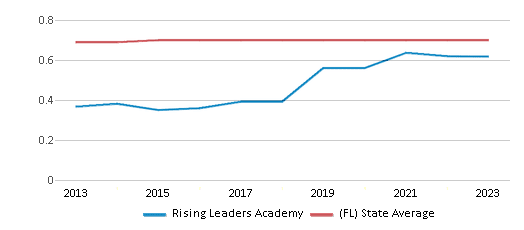
Participates in the National School Lunch Program (NSLP)
Yes
Eligible for Free Lunch
38%
47%
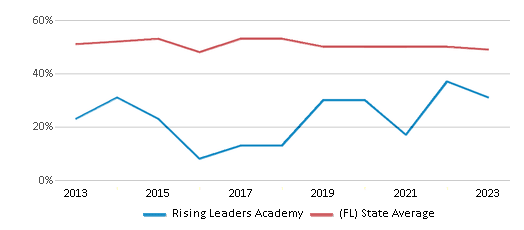
Eligible for Reduced Lunch
5%
4%
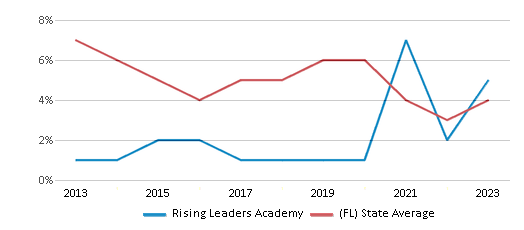
School Statewide Testing
School District Name
Source: National Center for Education Statistics (NCES), FL Dept. of Education
Profile last updated: 02/09/2025
Frequently Asked Questions
What is Rising Leaders Academy's ranking?
Rising Leaders Academy is ranked #737 out of 3,704 schools, which ranks it among the top 20% of public schools in Florida.
What schools are Rising Leaders Academy often compared to?
Rising Leaders Academyis often viewed alongside schools like University Academy Sabl Inc by visitors of our site.
What percent of students have achieved state testing proficiency in math and reading?
65-69% of students have achieved math proficiency (compared to the 52% FL state average), while 65-69% of students have achieved reading proficiency (compared to the 52% FL state average).
How many students attend Rising Leaders Academy?
309 students attend Rising Leaders Academy.
What is the racial composition of the student body?
53% of Rising Leaders Academy students are White, 20% of students are Black, 13% of students are Hispanic, 8% of students are Two or more races, 5% of students are Asian, and 1% of students are American Indian.
What is the student:teacher ratio of Rising Leaders Academy?
Rising Leaders Academy has a student ration of 22:1, which is higher than the Florida state average of 17:1.
What grades does Rising Leaders Academy offer ?
Rising Leaders Academy offers enrollment in grades Kindergarten-12
What school district is Rising Leaders Academy part of?
Rising Leaders Academy is part of Bay School District.
School Reviews
5 3/31/2022
Excellent school. love it.
3 3/3/2020
Excellent instruction Math,Reading and creative arts but very heavy homework and unsure of current administration that may not be as seems. Principal inclination is to suspend vs counsel — even kindergarteners— not at their behavior expectations. Maturity & autonomy and excellent behavior expected from even youngest children despite very long days. Heard principal, who mostly seems very nice and sympathetically, yelling repeatedly at young kids during 10 minutes quiet time required at lunch one day and talking in office about student behavior in front of the student (and others in office) waiting for their parent. If your child generally behaves very well/emotionally mature, can manage lots of homework, and can sit still for long periods of day, go for it. Great instruction, caring teachers, small school feeling, interesting extra programs.
Review Rising Leaders Academy. Reviews should be a few sentences in length. Please include any comments on:
- Quality of academic programs, teachers, and facilities
- Availability of music, art, sports and other extracurricular activities
Recent Articles

What Is A Charter School?
Explore the world of charter schools in this comprehensive guide. Learn about their history, how they operate, and the pros and cons of this educational innovation. Discover key facts about charter schools, including admission policies, demographics, and funding, as well as what to look for when considering a charter school for your child.

10 Reasons Why High School Sports Benefit Students
Discover the 10 compelling reasons why high school sports are beneficial for students. This comprehensive article explores how athletics enhance academic performance, foster personal growth, and develop crucial life skills. From improved fitness and time management to leadership development and community representation, learn why participating in high school sports can be a game-changer for students' overall success and well-being.

February 05, 2025
Understanding the U.S. Department of Education: Structure, Impact, and EvolutionWe explore how the Department of Education shapes American education, from its cabinet-level leadership to its impact on millions of students, written for general audiences seeking clarity on this vital institution.









